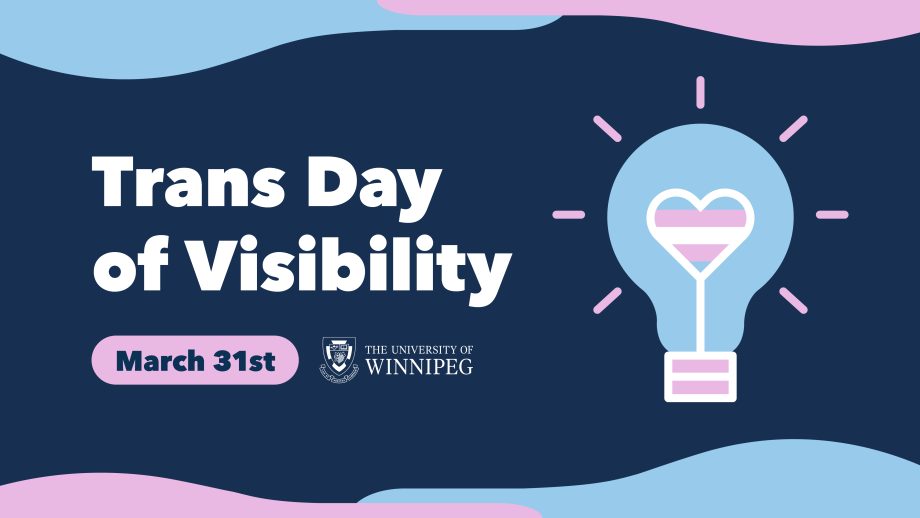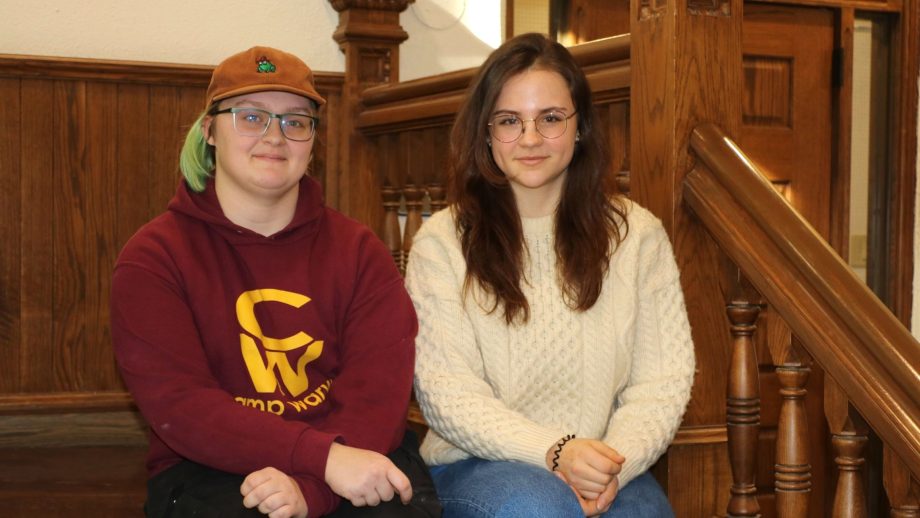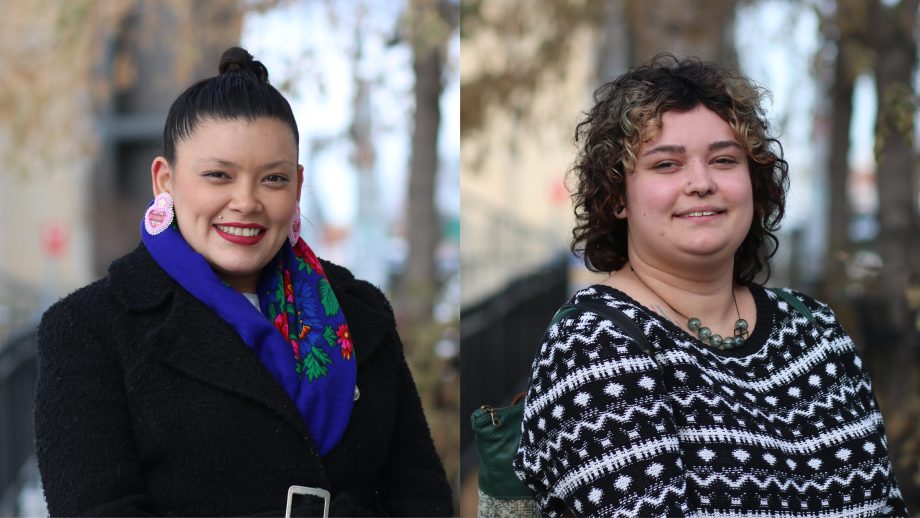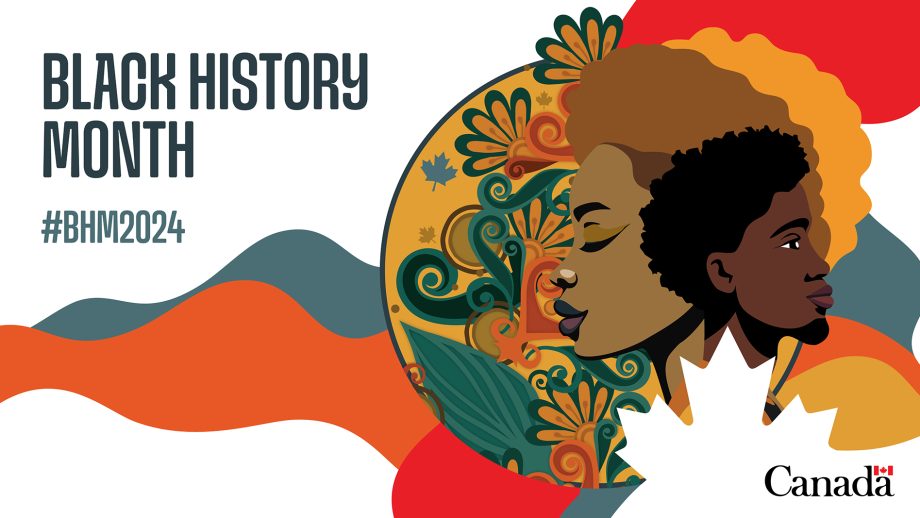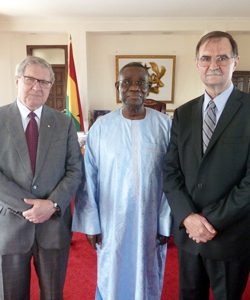
(photo l-r, UWinnipeg President & Vice Chancellor Dr. Axworthy, Ghana’s President John Atta Mills and Wayne Dunn)
WINNIPEG, MB – The University of Winnipeg and the University for Development Studies from Ghana have agreed to establish a working relationship between the Masters in Development Practice program and UDS Dept. of Integrated Development Studies that will lead to a joint initiative on the study of development practice for Indigenous and Traditional societies. Ghana’s President John Atta Mills said that he welcomed the initiative of the University of Winnipeg and the University for Development Studies (UDS) to work together to further research, education and practice in the area of Indigenous and Traditional Peoples development.
Dr. Axworthy and President Mills, who have known each other over the past decade, agreed that such an initiative can be very important in the mutual efforts to deal with climate change and development issues including the relationship between mining and other extractive sector activities that impact indigenous and traditional lands.
The UDS/UW has signed an MOU that supports the educational objectives of each institution as well as the development objectives of northern Ghana. The MOU encourages student exchanges, professional and academic development of lecturers and professors, visiting professorships and lecturing engagements, joint research and development projects as well as the development of graduate and post graduate programs around Indigenous knowledge, environmental stewardship and community development.
The UDS/UW collaboration will also enhance UWinnipeg’s new MDP degree, which is part of a global network of 23 Universities working in collaboration to foster an innovative new approach to development education, research and community/field practices.
UDS in Ghana is pioneering a highly innovative curriculum for all of its students. Every student must do two 8-week field placements in local communities. This is done in inter-disciplinary teams of ten students from various departments (agriculture, engineering, pre-medicine, education, etc.) and provides every undergrad student with direct community development experience. This fits the mission statement of the University of Winnipeg in terms of its community learning initiatives.
Dr Axworthy also met with a number of education and development institutions in Ghana as well as a number of students who are keenly interested in University of Winnipeg programs, including especially the MDP program.
Dr Axworthy also presented a letter from the Deputy Minister of Advanced Education from Manitoba, seeking closer arrangements on developing applied technical education programs. President Mills welcomed this cooperation and urged the parties to continue.
During the week Dr. Axworthy also met with Minister of Education, the Minister of Environment, Science and Technology, the CEO of the Savannah Accelerated Development Authority, the Head of the United Nations in Ghana and the Head of the UN’s World Food Program in Ghana, as well as giving two public lectures on Education as the Foundation of Development.
This initiative with the President of Ghana, UDS and other Ghanaian institutions fits the active efforts by The University of Winnipeg to provide an international presence and to support the efforts at expanding the role of the city and the province in international trade, environment and development issues.
BACKGROUND
University for Development Studies (Tamale, Ghana)
Established in May 1992 by the Government of Ghana to “blend the academic world with that of the community in order to provide constructive interaction between the two for the total development of Northern Ghana, in particular, and the country as a whole.”
The university by its mandate and constituency has a pro-poor focus. This is reflected in its methodology of teaching, research and outreach services. The specific emphasis on practically-oriented research and field-based training is aimed at contributing towards poverty reduction in order to accelerate national development. It began academic work in September 1993 with the admission of thirty-nine students into the Faculty of Agriculture.
The Faculty of Integrated Development Studies, Faculty of Planning and Land Management and Faculty of Education, Wa, School of Business, Wa, School of Medicine and Health Sciences, Faculty of Renewable Natural Resources, Faculty of Applied Sciences, Faculty of Mathematical Sciences and Graduate School were phased in from 1994 to date. Find out more at University for Development Studies (Tamale, Ghana)
University of Winnipeg (Winnipeg, Canada)
The University of Winnipeg is a national leader in attracting Indigenous students and nurturing Indigenous scholarship, offering a number of programs that are unique in Canada including a Masters in Indigenous Governance, a Master of Arts in Environmental, Resource and Development Economics and a unique Master’s in Development Practice (MDP) in Indigenous Development – with support from the MacArthur Foundation. This two-year program of study consists of course work, applied research and field placements. The program transcends borders by offering online “global classrooms” that will connect students to an international network of 22 other universities as well as with local, rural, and remote communities around the world.
UWinnipeg is also dissolving the line between campus and community with an holistic approach to Community Learning. This includes working with children as young as 10 years old from war-affected countries, new immigrant and Indigenous families, and those who are economically disadvantaged to erase barriers so that one day, they will be able to attend University. Find out more at UWinnipeg.

